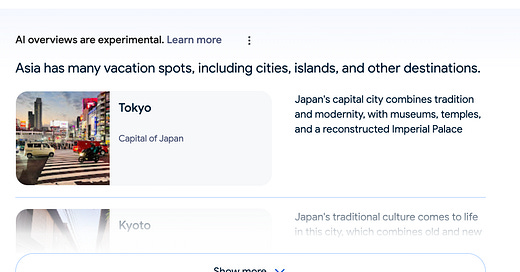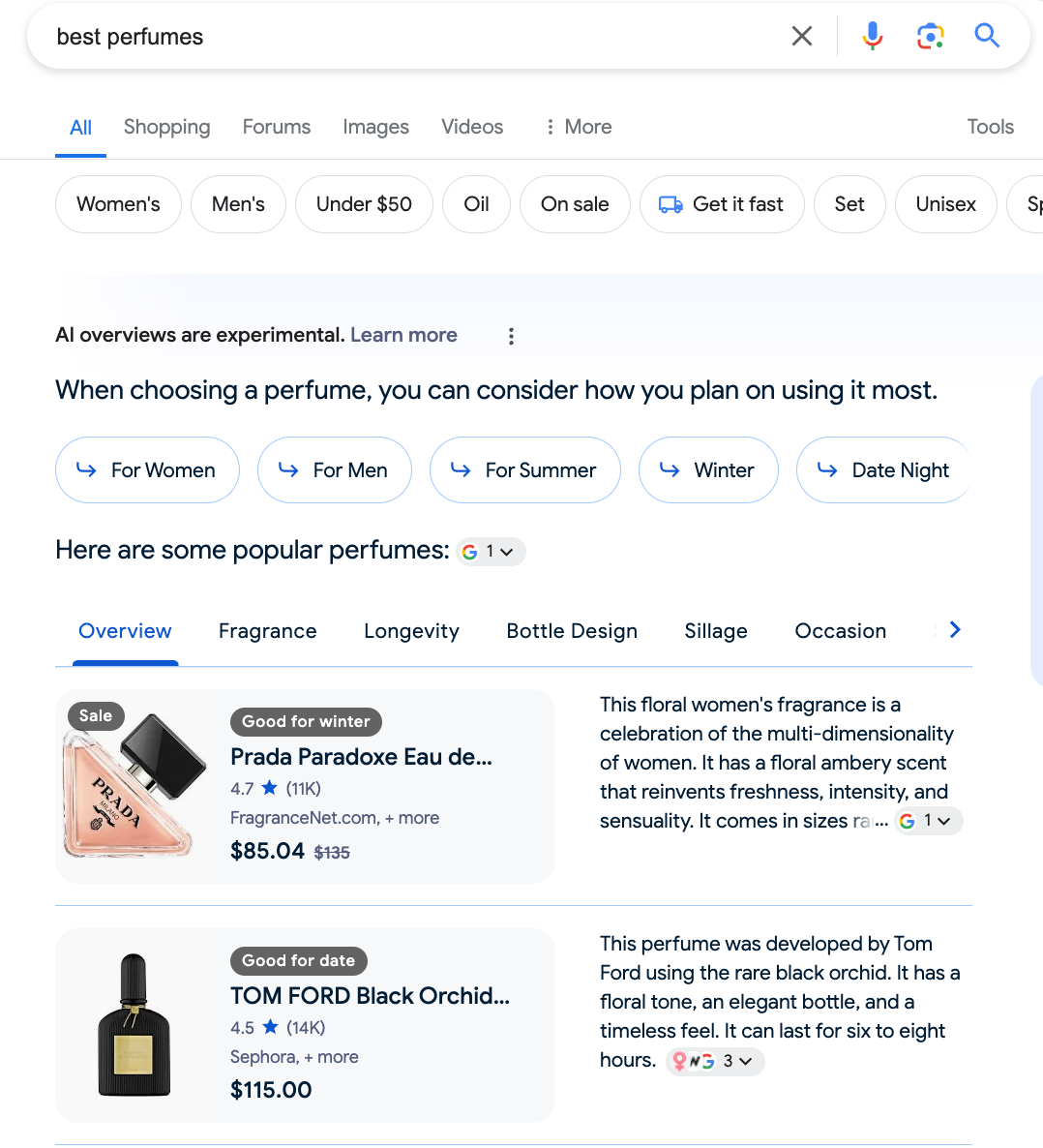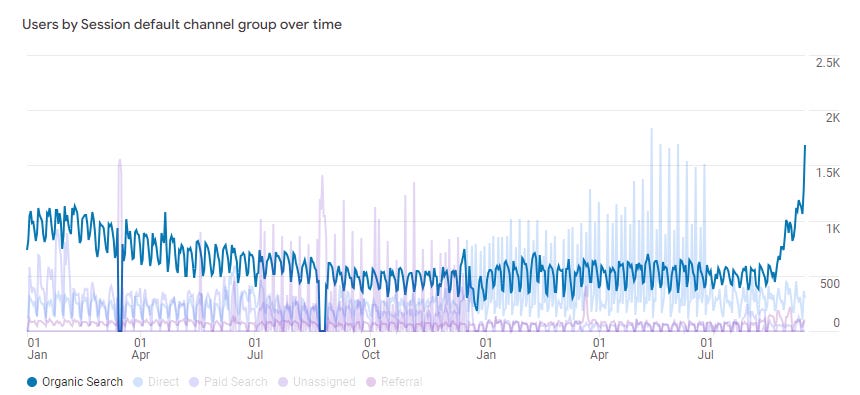AI will not replace search and SEO will never die
Search is about choice, and while AI search via an LLM can offer some choices, they will be constrained. If an LLM includes too many choices, it becomes another search engine.
This week’s newsletter is sponsored by the Digital PR agency Search Intelligence, which uses PR methods to grow a link portfolio and North Star Inbound, which is a recommended agency for penalty recovery. See their case studies linked in the newsletter.
This week’s recommended resources:
{Sponsored} TheWordsmith.ai - Marketing Copilot that operates at the intersection of Brand and AI. Use your own OpenAI API Key. Learn how.
Participate in an SEO version of Superbowl squares and predict how and when SGE will launch. The winner will receive prizes and swag.
I love learning about new SEO and AI tools; please reply if you have any to share.
Since ChatGPT launched in the last year and a half, many have declared the end of Google’s dominance and, as a result, the death of SEO.
I don’t think that will ever happen.
In short, search is about choice, and while AI search via an LLM can offer some choices, they will be constrained. If an LLM includes too many options, it becomes another search engine.
In this example, the results are limited to four possibilities and don’t contain any context.
It’s possible that the response can add more filters, but even these filters will be limited. (Note this update to SGE below, which users can filter and compare without conducting a follow-up query.)
Voice search doesn’t have choice
This is why voice searches via Google Assistant, Siri, and Alexa never took off. These audio solutions only satisfy searches that can be answered in a single response, such as “What is the weather tomorrow?” or “What is the capital of Canada.” Searches like the best places to go on a beach vacation require refinements that are far easier to make when the choices are presented visually.
[SPONSORED by Search Intelligence]
We built 300 PR links for his betting client, and their visibility exploded on Google.
But it’s not just our links that made their website chart look like NVIDIA stock.
Links in some of the world's largest publications: NBC, NY Post, Express, Mirror, and hundreds more.
This is in addition to the super-relevant links they are also building via other methods.
SEO is changing.
Link building is changing.
There may come a time when the voice assistants prompt the user for additional clarifications before making a recommendation. However, the user will still have too limited a choice to make this the default option. Also, imagine how annoying something like this might be.
When presented with choices, you make hundreds of automatic decisions, but an AI would need intense personalization to make all of those decisions without asking many follow-up questions.
The Primacy of User Search
Search engines are driven by the fundamental human need to make decisions that suit their tastes. This is why the cereal shelves at a grocery store have many options, and apparel stores take up entire city blocks. The world would be very dull if there were only one option for each need. Thirsty? Here’s water. Hungry? Here’s an apple. Cold? Here’s a grey blanket.
Even someone who loves water, apples, and grey blankets still desires to make that choice whenever they need it and sometimes even to choose something else.
Search engines offer a choice
Search engines are the grocery store's digital version of that cereal shelf. Brands play a huge role in customers' purchase decisions as a second parallel to the grocery store. A search that displays the results and the brands that have created them retains the option for the user to choose the brands they want. An LLM will just become the generic response, and the brand of the content becomes its own brand. Generic Cheerios might taste the same as Cheerios, but it’s not Cheerios.
Even with deep personalization powered by an AI that might know an individual better than they know themself, it’s still only artificial intelligence, and the natural intelligence innate in every human can sometimes have different emotions that drive other choices.
Search is more than just ten links
To underscore this further, users don’t just need the ten results on a Google search results first page; there are hundreds and thousands of results on further pages. Granted, most people don’t scroll past that first page, but there are certainly clicks that happen at position ten. If there was no value in having more than ten results for any given query, you can be confident that Google (and other search engines) would have deprecated that option years ago.
This explains why I don’t think AI-only LLMs will fully replace search engines. However, I still believe there is a substantial threat from generative AI hybrid engines like Google is doing with SGE, and ChatGPT might eventually do.
This allows the user the best of both worlds because they have quick answers while retaining the ability to choose.
In this paradigm, SEO is more crucial than ever. While the structure of search traffic changes if users get their answers from SGE, the role of the SEO person is to best position the brand so it is highlighted in SEO. That might happen accidentally, but relying on luck is not a recipe for success in online marketing.
SEO shapes SGE
Much of SGE will likely be summaries from the top-ranking results as it does today. Showing up in those top results is the role of SEO today and will be the role of SEO in the future.
SEO leads from the front
Search is morphing into something new, and companies can sit and wait for that change to happen or have a strong SEO leader guide that change. As we have seen from AI to date, this will be a moving target, so the job of the search leader will never be done.
Rather than becoming obsolete, SEO is adapting to the changing algorithms and user behaviors driven by AI. Critical aspects of SEO, such as keyword research, content optimization, and technical website optimization, remain crucial. However, the focus is shifting towards a more holistic approach considering user intent, context, and the overall user experience. AI-powered tools and technologies enhance SEO practices, providing deeper insights into user behavior, content performance, and emerging trends. This allows SEO professionals to create more targeted and relevant content that resonates with their audience, ultimately improving search rankings and driving better results.
Last week I shared about how to move to mid-funnel SEO strategies, and this should be the focus
The pull channel of search will never die
This search channel, whether from an LLM or ten blue results, will always exist, and there needs to be a champion for it internally. Again, the job description, roles, and responsibilities will change, but the need for this champion will remain.
AI-powered tools can assist in tasks like content generation, keyword research, and technical audits, but they cannot fully replace the human expertise and decision-making required to develop and execute a successful SEO strategy. SEO professionals who embrace AI and integrate it into their workflows will be better equipped to stay ahead of the curve, anticipate changes in the search landscape, and deliver exceptional results for their businesses.
While AI has undoubtedly transformed various aspects of digital marketing, the need for search engines and the SEOs that shape them remains as crucial as ever. As the digital landscape continues to evolve, the importance of SEO will only grow, and businesses that recognize and adapt to this reality will be well-positioned to succeed in the years to come. Think of AI in the future as the advanced complement and improvement to the search engine, not as the replacement.
[Sponsored by North Star Inbound ]
How to shrink your site and double your traffic.
Most of us are familiar with the basic content audit. We analyze and place pages into one of four categories: remove, replace, redirect, and combine.
But simple ≠ easy.
If you’re categorizing based solely on quantitative data like traffic and rankings, you’re likely oversimplifying and may hurt yourself more than you help.
Qualitative factors are crucial to good content audits.
Here’s why.
Each page should be analyzed qualitatively before being categorized.
Look at the low-performing pages as a group. What can you learn from the high performers? Are there any patterns?
Recently, Google has narrowed the authority of many sites. Has Google narrowed your expertise?
Sometimes the SERP has changed. So, pages need to be updated to match.
We’ve leveraged content audits to help sites achieve a quick ROI as well as a crucial step in recovering from core updates.
Contact us here to get yours today.







I switched from Google to Perplexity some months ago. Current results from Google are poor. The first 3/4 of search page results are from Quora and Reddit. After those results, I have to trawl through stuff, looking for relevancy and then checking accuracy. It appears that Google deems these results as authentic and trustworthy, written by experts with authority. Anyone spending time on either platform will know this isn't the case. Worse still, there are many fake profiles on both platforms. While these sources may be useful for some, they give me very little when I'm doing in-depth research. And I read the same take on this from content creators in the various groups I belong to on Facebook.